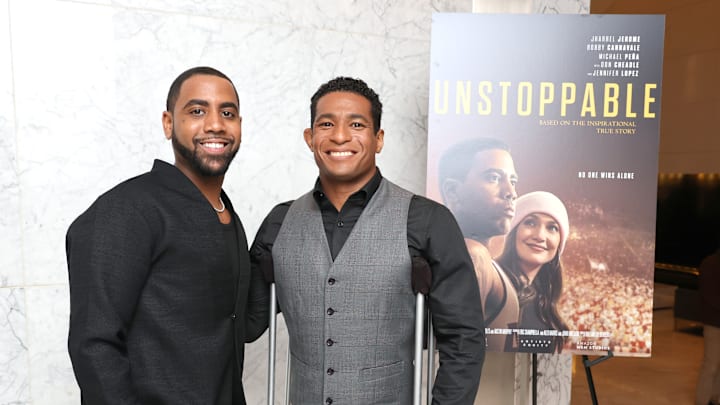It’s been five years since the documentary Crip Camp. Released a few weeks into the COVID-19 pandemic shutting down the world, this outstanding motion picture chronicled the attendees of a summer camp for disabled teenagers in the summer of 1971. The folks here form such profound bonds that their friendships span decades and later foray into advocacy for disability rights.
It’s an incredibly rich documentary on several fronts including its fervent dedication to showing a thriving community of wildly varying disabled individuals. Mainstream cinema often treats disabled folks as being the only disabled people in all of existence, their lives solely defined by able-bodied spectators. Not so in Crip Camp, which shows the endless manifestations of disabled Americans.
Yes, it’s been five years since Crip Camp…and movies like Unstoppable still exist. Here yet again is another narrative movie where apparently only one disabled person exists in all of Arizona. To boot, that disabled person must be “a hero” or “inspirational” to able-bodied people to be worthy of getting a movie centered around him. Great.
Unstoppable linearly chronicles five years (four in college, one in High School) in the life of Anthony Robles (Jharrel Jerome). Born with one leg and a fighter's spirit, Robles becomes a wrestling phenomenon in his high school. He also harbors dreams of being a champion like Rocky Balboa, which allows Unstoppable time to cross-promote another MGM movie franchise. Though he receives a full-ride scholarship offer from Drexel University, he opts to go the tougher path of paying tuition to attend Arizona State University as a walk-on for the school's wrestling team.
While going here, his family struggles with endless financial hardships. His mom, Judy Robles (Jennifer Lopez), especially faces ceaseless difficulties in her abusive relationship with her husband Rich (Bobby Cannavale). These domestic issues begin spilling over into our hero’s Arizona State University excursions. Can he pin down his sports ambitions even with so many obstacles (including ASU’s wrestling program getting cut) breathing down his neck?
Adapted from the book Unstoppable: From Underdog to Undefeated: How I Became a Champion written by Robles and Austin Murphy, Unstoppables’s screenplay from Eric Champnella, Alex Harris, and John Hindman is a lifeless concoction. Once again, audiences are trapped at the mercy of a biopic putting comprehensiveness over what works for a movie. Tackling five years of Robles’ existence in just two hours inevitably leaves significant passages of his life poorly developed. Individual bursts of financial turmoil in his family are specially handled in a ham-fisted fashion before vanishing entirely.
Long-time editor William Goldenberg makes his directorial debut on Unstoppable and, unfortunately, compounds the feature’s listless aesthetic. Unstoppable’s visuals lack urgency or any distinct identity. The various wrestling matches are especially poorly filmed. Ceaseless cuts and aloof camerawork dominate these pivotal segments. Compare these images to the more idiosyncratic filming techniques in other sports movies like The Fire Inside, Challengers, or Creed. Even Ericson Core’s disorienting relentless 360-degree shots in Invincible demonstrated visual conviction. Within Unstoppable, Goldenberg and the cinematographer show no such versatility or imagination. Sequences of Rich tormenting the Robles family are filmed in a similar fashion to the most critical wrestling matches.
The stale shooting style and Disney Channel Original Movie script make Unstoppable a microcosm of what a modern streaming movie looks like. These titles are basically TV movies, except they have the moolah to attract actual movie stars to show up on-screen. Just seeing Don Cheadle and Michael Pena spout banal dialogue, though, doesn’t suddenly turn the sports movie equivalent of Zenon: Girl of the 21st Century into Warrior or Dangal. Disenchanted, The Gray Man, and Bright are all great examples of how no amount of stars can polish a TV movie into something more substantial. Unstoppable firmly joins these titles.
Giving way more than this feature deserves is the endlessly talented Jharrel Jerome. After excelling in excellent limited-run shows When They See Us and I’m a Virgo, Jerome exudes more lived-in humanity than anything else in Unstoppable. The most memorable sequence concerns the camera just lingering on an unbroken take of Jerome as Robles delivers a monologue about why winning means so much to him. All you need to make this sequence captivating is Jerome’s talents as an actor. He’s worthy of a gold medal and more interesting motion pictures to anchor!
Putting in way less distinctive work is composer Alexandre Desplat. I was shocked to see him listed in the credits as Unstoppable's composer! What on Earth happened to Desplat? Unless he’s composing a Wes Anderson movie, it feels like he's been on autopilot in the last five years with his forgettable scores for titles like The Lost King and Nyad. He delivered such outstanding compositions for Little Women as late as 2019! Surely, he can do better than his lifeless tracks for Unstoppable, which lack the vigor and energy one yearns for when watching inspirational sports movies.
Desplat isn’t the only one let down within Unstoppable. Moviegoers hoping for an engaging yarn will inevitably greet this paint-by-numbers entry in the sports movie canon with shrugs. Only Jerome exudes liveliness in a motion picture otherwise assembled seemingly mechanically. Unstoppable has shout-outs to other MGM movies (namely Rocky and Air) to spare, but little to offer as a standalone piece of entertainment. Go check out Tony Scott’s Unstoppable instead. Now there’s a movie that MOVES and fulfills audience expectations.
